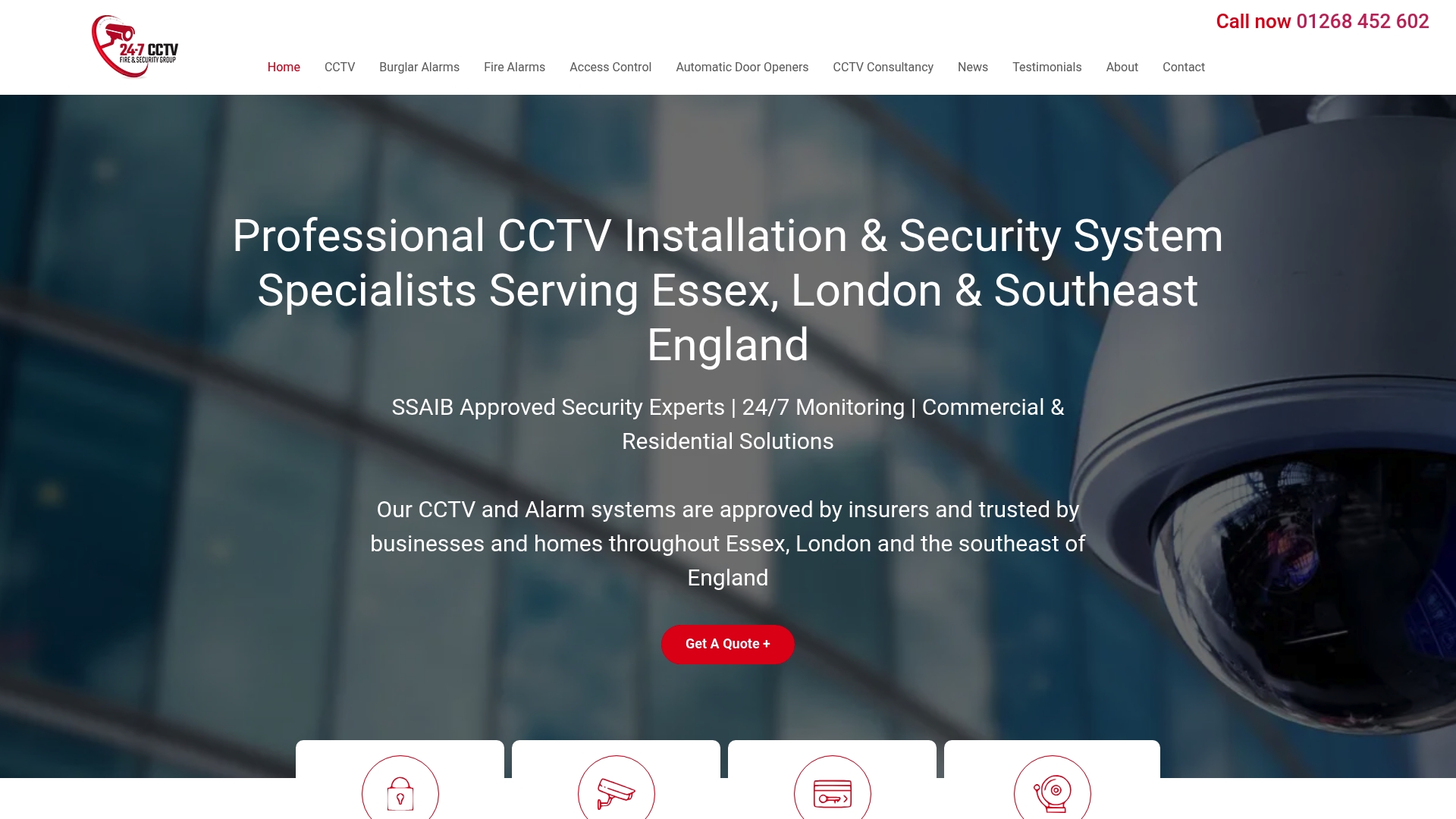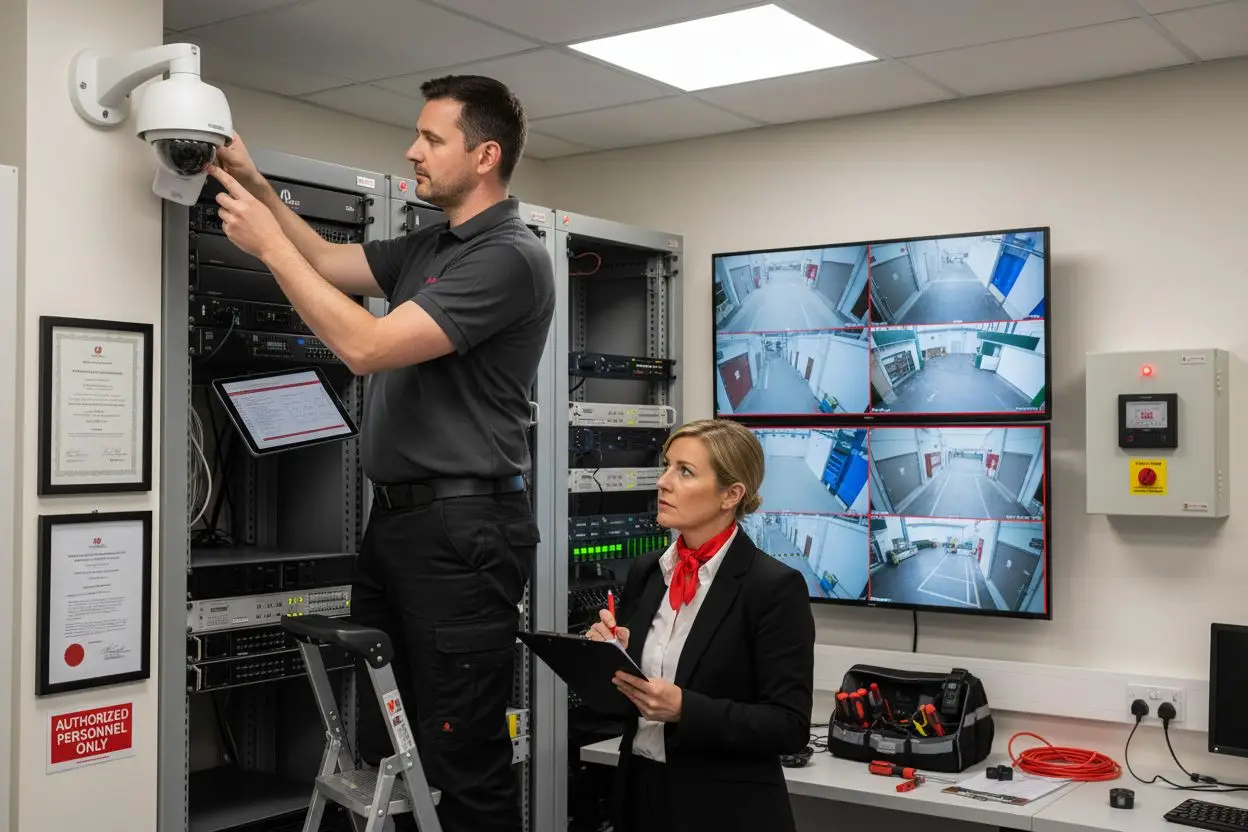Did you know that over 60 percent of security system failures are linked to poor maintenance? Many property owners overlook routine checks, yet a single missed inspection can leave vital assets vulnerable and put insurance coverage at risk. Knowing the key maintenance needs for your security systems can help prevent costly breakdowns, meet insurance requirements, and keep your property protected year-round.
Key Takeaways
| Point | Details |
|---|---|
| Investment in Maintenance | Regular maintenance of security systems is essential for optimal performance and compliance with insurance standards. |
| Scheduled Servicing Requirements | Different types of security systems require specific maintenance intervals; for instance, CCTV and intruder alarms must be serviced annually. |
| Implications of Neglect | Failing to maintain security systems can lead to increased risks, including equipment failure and potential insurance coverage issues. |
| Legal and Financial Compliance | Ensuring that systems are maintained according to established standards is crucial for legal protection and minimizing insurance liabilities. |
Table of Contents
- Defining Security System Maintenance Needs
- Types of Security Systems and Their Requirements
- How Regular Maintenance Protects Properties
- Legal and Insurance Implications in the UK
- Risks of Neglecting System Maintenance
Defining Security System Maintenance Needs
Security system maintenance isn’t just a routine task—it’s a strategic investment in protecting your property and ensuring continuous operational reliability. Security system maintenance encompasses systematic checks, cleaning, testing, and potential repairs of all security infrastructure, from CCTV cameras to alarm systems. According to industry research, systems such as CCTV and alarms require professional servicing between one to two times annually to maintain peak performance and meet critical insurance compliance requirements.
Professional maintenance involves comprehensive assessments that go beyond simple visual inspections. Uncover the hidden risks of outdated security systems to understand why proactive maintenance is crucial. In the UK, independently certified alarm systems have specific servicing protocols: audible-only intruder alarms demand annual service visits, while monitored systems require biannual checks to verify sensor functionality, power unit integrity, and overall component performance.
Key maintenance activities typically include:
- Cleaning camera lenses and sensor surfaces
- Testing electrical connections and power supplies
- Checking software and firmware updates
- Verifying recording and storage systems
- Assessing physical mounting and positioning of security equipment
By prioritising regular maintenance, businesses and property owners can prevent potential system failures, reduce long-term repair costs, and maintain a robust security infrastructure that provides reliable protection.
Types of Security Systems and Their Requirements
Navigating the landscape of security systems reveals a diverse array of technologies designed to protect properties and assets. Each system type comes with unique maintenance requirements and operational characteristics. According to security maintenance standards, different security infrastructures demand specific care intervals to ensure optimal performance and reliability.
The primary security system types include CCTV surveillance, intruder alarms, access control, and automated gate systems. Explore the key features of modern CCTV systems to understand their complexity. Maintenance intervals vary significantly across these systems: intruder alarms conforming to Insurance Grade 2 and 3 standards require annual professional maintenance, while CCTV and access control systems mandate yearly engineer visits aligned with SSAIB (Security Systems and Alarm Inspection Board) standards.
Key system types and their maintenance requirements include:
Here is a summary of key security system types and their recommended maintenance intervals:
| System Type | Typical Maintenance Interval | Key Maintenance Tasks |
|---|---|---|
| CCTV Surveillance | Annual inspection | Lens cleaning Software updates Storage check |
| Intruder Alarms | Annual (Grade 2/3); Biannual (monitored) | Sensor testing Power supply check Alarm response check |
| Access Control | Annual engineer review | Component testing Firmware updates |
| Automated Gate Systems | Every 6-12 months | Mechanical check Safety edge testing Lubrication |
| Wireless Systems | As needed (typically annually) | Battery check Signal strength test |
- CCTV Systems: Annual comprehensive inspection
- Intruder Alarms: Yearly maintenance for Grade 2 and 3 systems
- Access Control: Annual technical review and component testing
- Automated Gate Systems: Service every 6-12 months
- Wireless Systems: Regular signal strength and battery checks
By understanding these specific maintenance protocols, businesses and property owners can ensure their security infrastructure remains robust, compliant, and fully operational throughout the year.


How Regular Maintenance Protects Properties
Security system maintenance is far more than a routine checkbox—it’s a critical shield protecting your most valuable assets. Without consistent professional attention, security systems can develop hidden vulnerabilities that compromise protection when you need it most. According to security experts, undetected faults can render entire security infrastructures ineffective, leaving properties exposed to potential risks.
Maximize your security investment with essential preventive maintenance strategies to understand the comprehensive protection regular servicing provides. Preventive maintenance contracts offer multiple layers of protection, including:
- Scheduled professional visits
- Remote diagnostic capabilities
- Rapid engineer response times
- Minimisation of false alarm incidents
- Preservation of insurance policy validity
The implications of neglecting maintenance extend beyond immediate security concerns. Unserviced systems can lead to:
- Increased likelihood of equipment failure
- Reduced system reliability
- Potential invalidation of insurance coverage
- Higher long-term repair and replacement costs
By investing in regular maintenance, property owners transform their security systems from passive infrastructure into proactive guardians, ensuring continuous, dependable protection against potential threats.
Legal and Insurance Implications in the UK
Security system maintenance is not just a technical requirement but a critical legal and financial consideration for UK businesses and property owners. Insurance compliance plays a pivotal role in determining the validity and effectiveness of security infrastructure, with insurers setting stringent standards for system certification and ongoing maintenance.
Explore the essentials of home security in the UK to understand the broader context of legal requirements. According to industry experts, insurers typically mandate specific conditions for security systems, including:
- Certification from recognised bodies like NSI or SSAIB
- Regular professional maintenance evidence
- Documented call-out cover
- Certificates of conformity
The potential consequences of neglecting these requirements can be severe. Businesses and property owners might face:
- Increased insurance premiums
- Reduced coverage limits
- Potential policy invalidation
- Compromised legal protection in case of security incidents
The Security Systems and Alarm Inspection Board (SSAIB) emphasises that maintenance contracts are not just recommended but often mandatory, especially for police-monitored systems. By maintaining comprehensive documentation and adhering to professional maintenance standards, property owners can ensure both legal compliance and robust insurance protection.
Risks of Neglecting System Maintenance
Security system neglect represents a critical vulnerability that can transform your protective infrastructure into a false sense of security. When security systems are left unserviced, they become progressively less reliable, potentially failing at the most crucial moments when protection is paramount. The consequences extend far beyond simple equipment malfunction.
Key maintenance tips can help maximise the lifespan of your security installations and mitigate potential risks. According to security experts, neglected systems expose properties to multiple significant risks:
- Increased likelihood of complete system failure
- Higher probability of false alarm triggers
- Potential invalidation of insurance coverage
- Reduced response effectiveness during actual security incidents
The financial and safety implications of system neglect are substantial. Unserviced security systems can:


- Incur higher emergency call-out costs
- Create vulnerabilities in property protection
- Compromise overall security infrastructure
- Result in potentially rejected insurance claims
Ultimately, regular maintenance is not an optional expense but a critical investment in comprehensive property protection. By addressing potential issues proactively, property owners can ensure their security systems remain robust, reliable, and ready to respond when truly needed.
Secure Your Property with Professional Maintenance Solutions
Are you concerned about hidden vulnerabilities, invalidated insurance, or the looming risk of security system failure? The article highlighted how proper security system maintenance—whether for CCTV, intruder alarms, or access control—is not just a technical chore but a crucial shield for every home and business in the UK. If unreliable surveillance or missing annual checks are keeping you up at night, it is time to take decisive action that protects what matters most. Explore proven solutions that address these real concerns and bring your property back to peak safety and compliance with the help of our expert team at 247 CCTV.


Do not let overlooked maintenance put your security and insurance at risk. Visit our main website now to see how we install and maintain CCTV, burglar alarms, and advanced door entry systems for both homes and businesses across the UK. Discover how our security installation services can make regular system upkeep simple, reliable, and fully compliant—so you can rest easy knowing your protection will never lapse.
Frequently Asked Questions
How often should security systems be maintained?
Security systems such as CCTV and intruder alarms typically require professional maintenance once or twice annually to ensure optimal performance and meet insurance compliance requirements.
What are the key maintenance activities for security systems?
Key maintenance activities include cleaning camera lenses, testing electrical connections, checking software updates, verifying recording systems, and assessing the overall condition of the security equipment.
What are the consequences of neglecting security system maintenance?
Neglecting maintenance can lead to increased likelihood of equipment failure, reduced system reliability, higher long-term repair costs, and potential invalidation of insurance coverage.
Are there legal implications for not maintaining security systems?
Yes, failure to maintain security systems can result in increased insurance premiums, policy invalidation, and compromised legal protection in the event of a security incident. Regular maintenance is often a requirement for maintaining insurance coverage.
Recommended
- Maximize Your Security Investment: Essential Preventive Maintenance Strategies – 247 CCTV Security Ltd
- Key Maintenance Tips to Maximise the Lifespan of Your Security Installations – 247 CCTV Security Ltd
- Uncovering the Hidden Risks of Outdated Security Systems and How to Address Them – 247 CCTV Security Ltd
- Expert Fire Alarm Maintenance Services | 247 CCTV Security Ltd
- Benefits of Having On-Site Security Guards for Your Retail Store – The Cricket Kingdom

